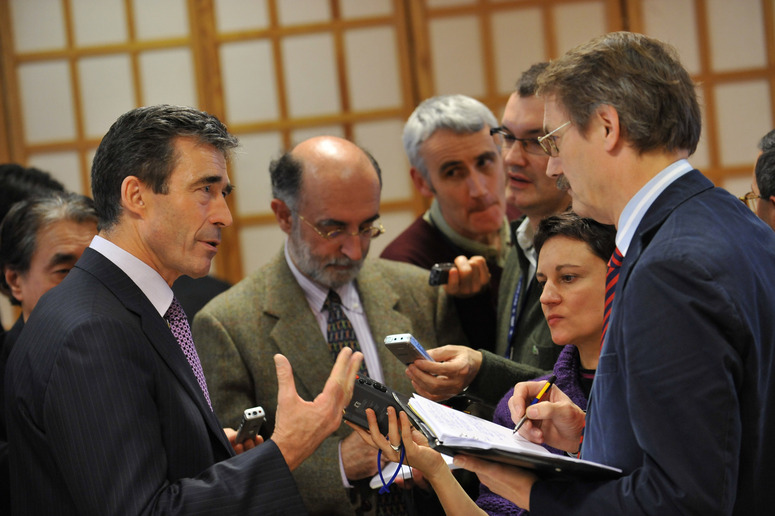Statement
by the NATO Secretary General on the Bratislava Ministerials at the reception for the press
- English
- Ukrainian

Ladies and Gentlemen, thank you for coming.
I know that these press receptions are an annual tradition here, and I’m happy to take it up -- to have the time to meet you properly, and to have a more informal discussion than we can have in the Press Theatre.
I also think that the media can play an important part in what I hope will be part of the transformation of NATO: increasing transparency about what this organisation is and what it does.
But I do believe that if we open the doors a little more; if we get better at showing the good work that gets done here, by very skilled people from 28 countries, to keep the almost 1 billion citizens of NATO countries safe; that can only benefit the organisation.
Which is why I am firmly committed not only to blogs and Tweets, but also to engaging with you as much as my calendar permits.
I don’t want to make a big speech here today. That’s not the idea. But I do want very quickly to look forward to the main event this week, to which many of you are going as well: the Bratislava Ministerial.
Very simply, I believe that we need to leave Bratislava on Friday afternoon with a shared view amongst NATO Defence Ministers on three key points.
First: I believe we need a general agreement on the approach we need to take in Afghanistan: and that should mean an endorsement of the approach set out by General McChrystal.
To my mind, it is clear. Hoping that Taliban extremists will never again host Al- Qaeda is not a strategy. They did it in the past. We can only assume they will do it in future. Which means that Afghanistan needs to be made strong enough to resist the insurgency, if it is to be able to resist terrorism. It’s as simple as that. And that is the essence of the McChrystal approach.
What does that mean? It means more and better reconstruction and development. It means holding the new Afghan Government to account, to deal with corruption effectively and visibly. And it means building Afghan Security forces strong enough to provide security in Afghanistan, with us in a supporting role.
I can’t talk today about what that would mean in terms of troop numbers. We are not there yet. But I do already welcome the UK announcement last week that envisions sending 500 more troops, as well as the focus on training and partnering with Afghan forces. All Allies need to look at what more they can do in this regard.
Which brings me to the second point on which I hope there is a shared view in Bratislava: the need to invest more – much more – in transition to Afghan lead.
We are just setting up a Training Mission for Afghanistan. I will be pushing Ministers hard to fully resource it – with trainers, equipment and money. It is a very simple calculation. If we want to be able to do less later, we have to invest more now.
The third main issue at Bratislava: missile defence.
As you know, the shift in US thinking on missile defence includes a more central role for NATO. I welcome that. I also welcome that the US plans are open to participation by all Allies, and can offer protection for all Allies.
Bratislava will be the first opportunity for NATO Defence Ministers to discuss the new US approach. I hope that there will be agreement to “NATO-ize” European missile defence -- to bring the planning more fully into NATO, and to discuss how to roll it out in a way that enhances solidarity, burden sharing and security between Allies, against a missile threat that is clearly growing.
That is all I wanted to say to kick off. I’d be happy to take a few questions from the podium – James will moderate – and then I’d like to wander around and meet with you more informally.
